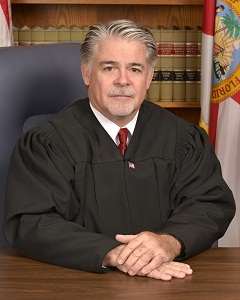The Tallahassee court hearing had just begun when the obscene interruption happened.
In Florida’s capital, the head of the local Republican Party was suing to overturn the County Commission’s requirement that everyone had to wear a mask to battle coronavirus. Because of the pandemic, the first court hearing on the case had to be held on Zoom.
Suddenly, someone not connected to the lawsuit crashed the hearing and began transmitting pornography. It didn’t last long. Within a few minutes, Circuit Judge John Cooper ejected the intruder and went on with the hearing. The interception ended so quickly, it didn’t even get mentioned in the news coverage of the case.
“We’ve been online for three months and this is the first time we’ve had a hearing interrupted by someone being disruptive,” said Leon County Courts Administrator Grant Slaydon. Otherwise, he said, the switch to online hearings has gone so smoothly that “I think you’re going to see a permanent change in the way cases are handled nationwide.”
Slaydon is far from the only Florida court official making that prediction.

“I think this is going to change the way we do things forever,” said Escambia County Circuit Judge John Miller, a family court judge in Pensacola, in the Florida Panhandle. “It turns out we don’t need to bring people to the courthouse for some things – pre-trial conferences, motions to compel discovery and child support hearings, for instance.”
RELATED: Legal proceedings around the country move back into courtrooms, cautiously
RELATED: Judicial turnover leaves immigration courts shorthanded
A Florida court is expected to be the first in the U.S. to attempt to hold a whole civil jury trial online, from jury selection to verdict, starting Thursday.
As the nation’s third most populous state, with more than 21.4 million residents, Florida deals with a caseload much larger than most other parts of the country. Normally the courthouses of Florida’s 20 judicial circuits, covering 67 counties, are bustling with defendants, plaintiffs, witnesses, attorneys, clerks, bailiffs, stenographers, judges and jurors.
But this spring, realizing how serious COVID-19 could become, the Florida Supreme Court gave all the circuits permission to move online as many of their annual 3 million court proceedings as possible.
Florida courts have a history of having to adapt to emergencies – think “hurricane season.” That improved their inclination and ability to be flexible, court officials said.
Rough estimates from the various circuits around the state say about 80 to 85 percent of court proceedings – case status hearings, motion hearings and hearings on protective orders, to name a few – are now being successfully handled using Zoom and other online-meeting software.
There have been glitches, of course. Some are minor, such as wonky WiFi connections and barking dogs jumping into lawyers’ laps. Some, however, have been more distracting.
In South Florida’s Broward County, Circuit Judge Dennis Bailey sent a memo to the local bar reminding the attorneys that even in online proceedings, they still need to look professional.

“It is remarkable how many attorneys appear inappropriately on camera,” the judge wrote in the letter posted to the bar’s website.
He wasn’t just talking about dressing casually, either: “One male lawyer appeared shirtless and one female attorney appeared still in bed, still under the covers. And putting on a beach cover-up won’t cover up you’re poolside in a bathing suit.”
Sometimes the problem is not the way the attorneys were dressed but where they appeared to be sitting. The Miami Herald reported that one Miami defense attorney, Philip Reizenstein, failed to check his Zoom background before appearing in an online court hearing, then discovered that one of his children had changed it so he appeared to be in front of a pink-and-purple Minecraft cartoon house. (He did not return numerous calls from the Legal Examiner seeking further details, such as how he disciplined his child.)
Few Florida attorneys were familiar with Zoom and other online conferencing systems prior to the pandemic, according to court officials. Some were still using flip phones, according to Charles Hydovitz, trial court administrator for Columbia County, about an hour west of Jacksonville. They had to upgrade to keep up.
“That’s been the biggest issue the courts in general have found,” said Hydovitz, who serves on the Florida Supreme Court’s statewide working group overseeing the shift to online hearings. “Not everybody had the appropriate technology.”
Some of the rural circuits had “very unstable internet service,” he said. They, too, had to upgrade.
However, once the more reluctant attorneys and judges tried online court proceedings, Judge Miller said, “now they’re saying, ‘How did we ever live without this?’”
They appreciate the efficiency, he explained. No more wasted time traveling back and forth to the courthouse. That’s especially helpful with appellate hearings that might involve attorneys from several cities hours away from where the proceedings are being conducted.
And no more waiting around far from their offices for other hearings to finish up before theirs can start. Now everything can be more tightly scheduled, and if there is a delay, then they can work on other things in their office rather than cooling their heels in the courthouse cafeteria.
Holding an online hearing also saves time for the attorneys’ clients, who no longer have to leave work to sit in court. They can simply show up for their Zoom hearing and once it’s done they’re already home.
One key to making the process work, Mills said, is requiring all parties to submit their motions and exhibits well in advance so they can be distributed to everyone before the hearing begins. But if something does come up that’s last minute, he said, “they can email or text it to my assistant, and she can distribute it. It’s been amazingly smooth.”
There are still problems, of course. Slaydon said judges have found that “it’s easier to control a courtroom full of people than to control a Zoom meeting full of people.”
And while some criminal court proceedings work all right via Zoom – for instance, a plea hearing in which the defendant appears from a room at the courthouse or the jail in which only the bailiffs are present – many do not fit neatly into the Zoom boxes. The biggest backlogs are occurring on the criminal side, court officials said.
Picking a jury, for either a criminal or civil trial, is still in the experimental stage in Florida. In July, a Miami court attempted doing jury selection via Zoom to hear a civil suit involving a home insurance dispute.
It went about as well as you might expect. Some potential jurors forgot to unmute themselves when answering questions from the attorneys. One, in an error reminiscent of the Leslie Nielsen movie The Naked Gun, left the connection un-muted during a trip to the bathroom.
However, once the jury was seated, things went more smoothly – in part because it was conducted in a courtroom, not online. Everyone who entered the otherwise empty courthouse had to undergo a temperature check. The witnesses sat behind a clear plexiglass shield. The attorneys made their opening statements wearing masks. The jurors sat six feet apart from each other in the gallery, rather than clumped together in the jury box. And the whole trial was streamed on YouTube so the public could watch without showing up.
Amid so many special preparations, the participants told the Miami Herald they did not expect to go back to holding multiple simultaneous jury trials any time soon. Meanwhile other circuits around the state expect to try their own jury-trial experiments and issue a report in October.
The empty courthouses may be leading to a bigger long-term problem than the slow pace of jury trials. It involves money.
The court clerk offices in Florida are largely self-funded. They depend on people who have been fined paying what they owe before they leave the courthouse. But with no one visiting the courthouses, few people are paying up, Hydovitz said. It’s understandable, given the economic crash in tourism-dependent Florida.
However, the missed payments are taking a toll on the clerks’ budgets, he said. The Columbia County clerk has already begun closing one day a week to save money and setting up rolling furloughs for its employees. If that keeps up, he said, it could lead to the cancellation of hearings because no clerk is available to handle the official records.
The Florida Supreme Court’s plan for dealing with the pandemic called for a four-phase approach to proceedings. In Phase I, everything that can be done online is moved online and the rest is postponed. In Phase 2, attorneys and judges can return to the courthouses for limited in-person hearings. Phase 3 loosens the restrictions up even more, and Phase 4 is the time to “go back to normal – although I’m not sure we’re ever going back to that,” Hydovitz said.
In June, four counties in the Panhandle – Escambia, Santa Rosa, Okaloosa and Walton – moved to Phase 2. But as soon as coronavirus cases began spiking across Florida, the attorneys petitioned judges to go back to Phase 1 and return to the safety of the online courts. How long that will last is anyone’s guess.
As the circuits encounter problems with the online proceedings, they are learning that sometimes there’s a simple fix. For instance, as a result of the obscene disruption of the mask hearing, Slaydon said, Leon County officials have learned an important lesson. Do not put the details for the Zoom meeting in the public notice of the hearing where anyone can see it. Instead, he said, they know now to give that to no one but the participants.











